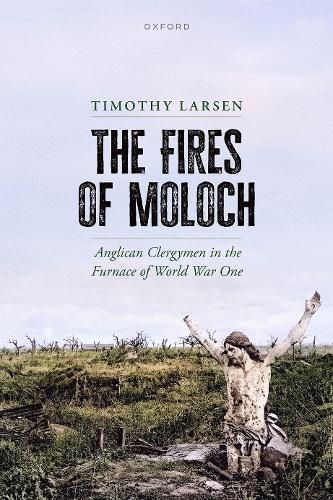Readings Newsletter
Become a Readings Member to make your shopping experience even easier.
Sign in or sign up for free!
You’re not far away from qualifying for FREE standard shipping within Australia
You’ve qualified for FREE standard shipping within Australia
The cart is loading…






The First World War is the bloodiest war in British history. As casualties mounted during one of its great, seemingly futile battles, the Passchendaele offensive of 1917, seventeen Anglican priests serving as temporary military chaplains wrote chapters for the book, The Church in the Furnace. In it, they urged the Church of England to make fundamental changes in the light of the war. They were impatient and hard-hitting. They gained a reputation as radicals. The Furnace seventeen experienced more than enough of the war. Some were wounded, others gassed. One of them was recognized as a war hero but suffered from shell shock for the rest of his life. Some won the Military Cross, the Distinguished Service Order, or other honours. One of them was the most famous padre of them all, the war poet G. A. Studdert Kennedy, who was widely known by his nickname, Woodbine Willie. The others included the Irish novelist, James O. Hannay (who wrote under the penname, George A. Birmingham), the Oxford theologian, Kenneth E. Kirk, and Eric Milner-White, whose response to the war included creating the Festival of Nine Lessons and Carols for Christmas Eve, King's College, Cambridge. Though they had been scathing about the Church hierarchy during the war, most of them lived to be consecrated a bishop. They strove to make sense of the turbulent events through which they lived, a span of years that included two world wars. Some of their brothers died in the First World War, and some of their sons in the Second World War. They spoke out on issues such as birth control, the League of Nations, Prayer Book revision, church reunion, and pacifism. They sought to do something with their lives after the war that would make retrospectively meaningful all the meaningless losses that had occurred during the war. The Fires of Moloch is a group biography of a generation which went through the fire--a generation which went from the Victorian age to the atomic age, but which was forever haunted by the trenches and battlefields of France and Flanders, 1914-18.
$9.00 standard shipping within Australia
FREE standard shipping within Australia for orders over $100.00
Express & International shipping calculated at checkout
The First World War is the bloodiest war in British history. As casualties mounted during one of its great, seemingly futile battles, the Passchendaele offensive of 1917, seventeen Anglican priests serving as temporary military chaplains wrote chapters for the book, The Church in the Furnace. In it, they urged the Church of England to make fundamental changes in the light of the war. They were impatient and hard-hitting. They gained a reputation as radicals. The Furnace seventeen experienced more than enough of the war. Some were wounded, others gassed. One of them was recognized as a war hero but suffered from shell shock for the rest of his life. Some won the Military Cross, the Distinguished Service Order, or other honours. One of them was the most famous padre of them all, the war poet G. A. Studdert Kennedy, who was widely known by his nickname, Woodbine Willie. The others included the Irish novelist, James O. Hannay (who wrote under the penname, George A. Birmingham), the Oxford theologian, Kenneth E. Kirk, and Eric Milner-White, whose response to the war included creating the Festival of Nine Lessons and Carols for Christmas Eve, King's College, Cambridge. Though they had been scathing about the Church hierarchy during the war, most of them lived to be consecrated a bishop. They strove to make sense of the turbulent events through which they lived, a span of years that included two world wars. Some of their brothers died in the First World War, and some of their sons in the Second World War. They spoke out on issues such as birth control, the League of Nations, Prayer Book revision, church reunion, and pacifism. They sought to do something with their lives after the war that would make retrospectively meaningful all the meaningless losses that had occurred during the war. The Fires of Moloch is a group biography of a generation which went through the fire--a generation which went from the Victorian age to the atomic age, but which was forever haunted by the trenches and battlefields of France and Flanders, 1914-18.